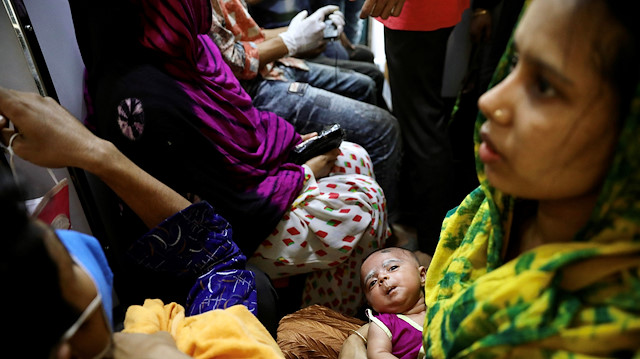
Shortages of funds, training, PPE for physicians, ICU beds for COVID-19 patients, raise fears of possible severe outbreak
Bangladesh is yet to be equipped with the necessary health care facilities and support to deal with serious cases of the novel coronavirus despite having much time since the virus first emerged in the ground zero, China, says experts.
Many have expressed concern that there is a serious lack of Intensive Care Unit (ICU) beds with facilities with ventilators, shortage of Personal Protective Equipment (PPE) for health care workers, testing kits and other resources, including a national fund to fight the COVID-19 outbreak.
"Bangladesh is facing these challenges because of a weak Health Ministry. There is a serious crisis of ICU beds prepared for patients and necessary training and supply of PPE to physicians and health care associates," Dr. Zafrullah Chowdhury, a Bangladeshi public health activist and founder of Gonoshasthaya Kendra, a rural health care organization with a modern medical facility, told Anadolu Agency.
According to reports, some local hospitals, including in the capital Dhaka, issued a notification for doctors to procure their own PPE due to a crisis of insufficient supply.
According to the Directorate of Health, there are 29 ICU beds with ventilators, a must for serious corona patients, reported the newspaper Business Standard.
"We got enough time to be prepared but we [Bangladesh] could not utilize our time," he added. "The government should have prepared and motivated our doctors and nurses, including by introducing insurance and special allowance, so that they do not feel unsafe during the war against corona," Chowdhury said.
Chowdhury is known for his work in formulating the Bangladesh National Drug Policy. He and Gonoshasthaya Kendra developed a $3 testing kit touted as being able to detect the coronavirus in less than 15 minutes.
His initiative to address the shortage of testing kits has received official approval for production, with production to begin after the necessary raw materials arrive from abroad.
He blamed the worldwide lockdown making it harder to obtain the necessary materials, as well as the government's non-cooperation, for slowing down the production process.
Among Bangladesh's roughly 10 million nationals working as migrant workers, many have returned to th. Chowdhury said the government should have better managed the return process -- especially from coronavirus-affected countries -- and provided special care and strict quarantine for returnees.
However, returnees are now back to their villages without proper instruction, worsening the situation, he added.
The Transparency International, Bangladesh (TIB) in statement on Saturday criticized the way the government allowed returnees from abroad to travel to their villages as fears mount of a heightened outbreak.
The TIB urged for the formation of a national fund, 10% of GDP, to fight the virus and suggest national policy with help from national and international experts without delay.
The Principal Scientific Officer (PSO) at the Institute of Epidemiology Disease Control and Research (IEDCR), Dr. A. S. M. Alamgir, told Anadolu Agency: "We are preparing doctors and other necessary initiatives according to our national preparedness policy, and the hospitals are getting prepared under the policy to deal with any possible situation."
He, however, declined to number how many ICU beds in hospitals there were for coronavirus patients, saying the government was working to raise the amount across the country.
Dr. A. S. M. Alamgir, however, said the Gonoshasthaya Kendra laboratory was not ready to produce local kits to test COVID-19.
"And, even if we provide emergency approval, it could not go for local kits production next week as there are some other necessary government proceedings for final approval for mass production," the official added, hinting further delays
Health Minister Zahid Maleque in a news conference in Dhaka last week said the government was working to increase the number of ICU bed for corona patient to 100 shortly and will gradually increase ICU units to 400. But he did not give any time frame.
Bangladesh has screen over 650,000 people in its international airports, ports and land borders, though there were only 28,483 people in quarantine and 47 in isolation, as of March 28. The country has 48 confirmed cases of COVID-19 and five deaths, according to the Directorate of Health.
According to the country's health ministry on Saturday, the government was on right path to address the coronavirus pandemic in Bangladesh.
Hello, the comments you share on our site are a valuable resource for other users. Please respect other users and different opinions. Do not use rude, offensive, derogatory, or discriminatory language.
The floor is all yours.








